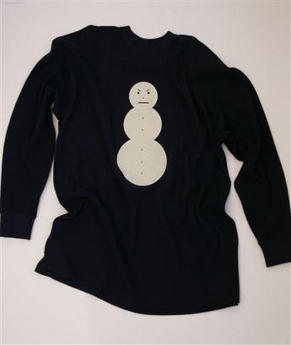|
Popular snowman T-shirt raises concerns
(AP)
Updated: 2005-11-05 19:33
One of the hottest-selling T-shirts around the country
shows a simply drawn snowman with a menacing expression.

A snowman shirt is seen in New York, Friday,
Nov. 4, 2005. The snowman image, which comes from drug
dealer-turned-rapper Young Jeezy, has anti-drug campaigners and education
officials alarmed. They say snowmen shirts are part of a sophisticated
marketing campaign using coded symbols for drug culture that parents and
teachers are not likely to understand. [AP] |
It's not Frosty's evil twin. The image popularized by
drug-dealer-turned-rapper Young Jeezy symbolizes those who sell a white
substance known on the street as snow: cocaine.
Anti-drug campaigners and education officials are alarmed, saying the T-shirt
and others like it are part of sophisticated marketing campaigns using coded
symbols for drug culture that parents and teachers are not likely to understand.
Some schools are banning kids from wearing the snowman images.
"The snowman is made of white, grainy stuff like sugar," said 12-year-old
seventh-grader Mailik Mason, standing next to his mother in a Manhattan store
selling the snowman shirts. "It has to do with a certain drug, crack or coke."
Young Jeezy's hit debut album, "Let's Get It: Thug Motivation 101," peaked at
No. 2 on the Billboard album charts. On one of his songs he raps, "Get it? Jeezy
the Snowman / I'm iced out, plus I got that snow, man."
The shirt was first produced solely for Jeezy by Miskeen Originals, a hip-hop
fashion firm in New Jersey, the company says. The owner, Yaniv Zaken, says his
artists produced a handful for the rapper to wear on TV appearances.
They then sold a larger batch to retailers, but pulled them when Zaken
discovered that his employees had not licensed the T-shirt from Jeezy.
"I wasn't sure what the snowman meant until the artist explained to me that
it was a drug dealer, the man delivering snow," Zaken said. "Now everyone is
selling the snowman — all unlicensed. It's become a street-hood hit worldwide."
A spokesman for Young Jeezy's record label, Def Jam Records, confirmed that
the rapper held the rights to the snowman image but declined to comment on
complaints that it was sending children the wrong message.
"This is part of a phenomena in which parents have no idea what their
children are exposed to. There is a code that children are aware of but not
parents," says Sue Rusche, president and CEO of the anti-drug group National
Families In Action.
Rusche's organization has tried to pressure companies that they believed were
targeting children with drug messages, like fashion companies marketing "heroin
chic" in the 1990s. She was unaware of the snowman T-shirt.
Mason says he'd like to have a snowman T-shirt — but that his school in
Brooklyn has banned it. His mother, Autherine Mason, 34, said she had been
unaware of the snowman's meaning and wouldn't buy it for her son now that she
knows.
Dr. Gilbert Botvin, director of the Institute for Prevention Research at
Cornell University Medical College, has been studying what influences children
to use drugs and alcohol. He believes that pop culture does play a role.
"The research tells us that influences coming from the media can have a
profound effect on kids and influence them to use drugs," he says. "All of these
things help to convey the impression that engaging in these behaviors using
drugs is normal and that drugs might help you be successful or sexy or
something."
Botvin says parents need to educate themselves about the media their kids are
consuming and pressure schools to monitor what messages they allow students to
advertise.
But sometimes it's hard to overcome the buzz on the street.
Ali Kourani, a Manhattan wholesale salesman, says the T-shirt is their top
seller across the country.
"It's big money," Kourani said.
|